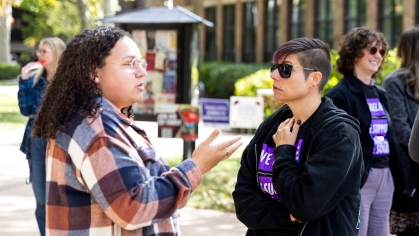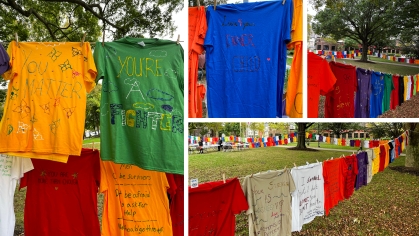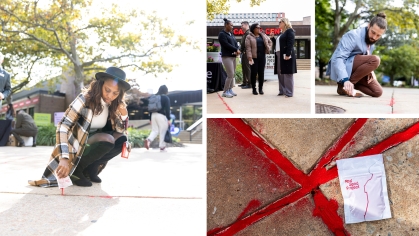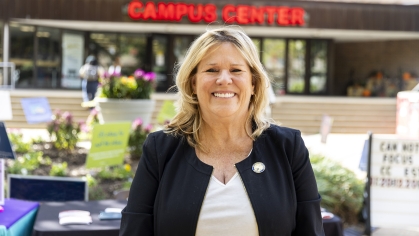“Turn the Campus Purple” Supports Victims of Domestic Violence

Just outside the Campus Center at Rutgers University–Camden, strings of delicate lavender lights wind their way around trees. Further along the paths of the Campus Quad, purple signs dot the lawn every several feet with messages of hope, encouragement, and information about how to find support in the face of intimate-partner violence or domestic violence.
These are just two elements of a much larger Turn the Campus Purple campaign designed to raise awareness among the campus community throughout October, which is Domestic Violence Awareness Month.
“We’re here for someone who may be in crisis or when an individual needs to make a formal report,” said Laura Luciano, associate director for the Office for Violence Prevention and Victim Assistance (VPVA).

The VPVA is a confidential, on-campus service committed to addressing and preventing interpersonal violence. It directly supports student survivors, offers educational opportunities about interpersonal violence, and promotes prevention initiatives like active bystander intervention. The goal is to shed light on an issue that is too often hidden in the shadows.
“In our last campus climate survey, 65% of the students said they had experienced domestic violence but did not tell anyone about it,” said Luciano. The same survey revealed that nearly one-third of the participants experienced some form of sexual violence before coming to campus, and 56% of respondents who were in a romantic relationship since coming to Rutgers–Camden reported at least one form of abuse.
Luciano emphasized, however, that supporting survivors is only part of VPVA’s mission.

“We also offer opportunities for everyone in the community to become better educated about these issues and how to support their peers who may be in a dangerous or difficult situation.”
Helping the larger campus community understand what their peers may be facing is critical to ending interpersonal violence.
Incorporating a community-based approach to intervention is important because it leads to the development of standards of behavior that are shared among everyone and helps define what is acceptable and what is not. Driving change is everyone's responsibility.
Laura Luciano
Associate Director for the Office for Violence Prevention and Victim Assistance

Luciano stressed that the programs and training offered by VPVA can help anyone learn practical skills for navigating challenging situations, whether they have been the victims of violence or not.
“Conflict is a natural part of life, but violence is never the answer,” said Luciano. “Our goal is to help people better understand how to navigate challenging, potentially volatile situations by learning how to communicate better and have difficult conversations, which ultimately help to prevent violence before it ever starts.”
The Red Sand Project

On October 16, Rutgers–Camden welcomed New Jersey Assembly Majority Whip Carol Murphy and the Red Sand Project to campus. First launched in 2014, the Red Sand Project is a public art and advocacy installation designed to raise awareness around the continued issue of human trafficking and modern slavery.
According to the United Nations, nearly 50 million people worldwide are enslaved or involved in human trafficking, and 12 million of that number are children. Victims are often subject to physical and psychological violence, and the tactics used by traffickers and their associates mirror the dynamics of domestic violence.
The Red Sand Project is near and dear to my heart because this is a problem that can happen anywhere, anytime, and the victims often feel very isolated. The idea behind using red sand to fill in the cracks in the sidewalk is representative of our effort to raise awareness so that no one falls through the cracks and becomes the victim of human trafficking.
Carol Murphy
New Jersey Assembly Majority Whip

In addition to the installation on display in front of the Campus Center, the day included a lunchtime talk from Ashley Boyer, a survivor of human trafficking and advocate for change. She shared her story of being kidnapped as a teen and forced into the commercial sex trade and how she ultimately found the courage to escape her captors.
“I didn’t realize for a long time that I was a trafficking victim,” said Boyer. “I just thought that bad things happen to me.”
Assemblywoman Murphy emphasized that the problem of human trafficking is pervasive, and it is everyone’s responsibility to stop it if possible.
“If you see something, say something – it’s that simple,” said Murphy.


